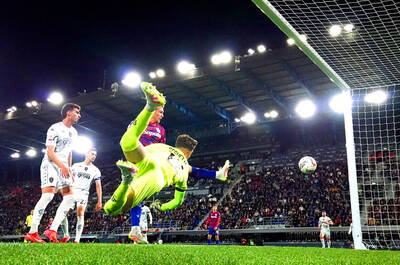Twenty-five years after her collision with Zola Budd left her sprawling on the Los Angeles Olympics track, Mary Slaney still wonders if the race that came to define her could have had a different outcome.
“All I know is that I ran the race unlike any other time I raced,” the US’ greatest middle-distance runner told reporters on a recent sunny morning.
Typically a front-runner, Slaney — then Mary Decker — said she followed her coach’s advice when she let others lead a portion of the 3,000m final many believed would bring her the ultimate prize of an Olympic gold medal.
“And that’s what I did,” said the 50-year-old Slaney, reflecting on the moments before she became entangled with the barefoot-running Budd and tumbled into the infield, injured, while the race continued without her.
Her coach, Dick Brown, told a news conference the next day that he and Decker, who was already world champion, had planned to let the South African-born, British-vested Budd lead, if she wanted, until the final lap. Their concern, he said, was not Budd, but eventual winner Maricica Puica of Romania.
“I am thinking the Olympics are so important, maybe I should listen to the coach,” said Slaney, who paced early portions of the race.
Although she no longer replays the Aug. 10 race in her head, she admitted: “If I had to go back and say: ‘Oh, are there any regrets?’ ... Well, the big regret is that I didn’t run the way I normally would have run.”
At the time, Slaney blamed Budd’s inexperience for the collision, even though Olympic officials cleared the teenager of fault.
Slaney, who had undergone several operations because of problems with her legs, had been denied the chance to compete in the 1980 Moscow Olympics because of the US-led boycott.
Heavily criticized in 1984 for her reaction towards Budd, Slaney still feels the pain of what happened.
“How is someone in their early 20s that’s been training and trying to get to the Olympics since they were 10, and it happens to be on US soil ...” she began before trailing off with: “And oh, my God.”
She said, though, that her reaction might have been different if she had been older at the time.
“You can’t change it,” said Slaney, who turns 51 on Aug. 4. “You don’t know if it would be any different if it happened now ... [but] I think as you get older, you are able to control things a little more with yourself.”
She and Budd participated in several events over the years that followed, but “there is really not a relationship,” the American said.
“It’s not like I knew her before or really had the opportunity to know her after. It’s just history,” she said. “It’s a part of the sport, part of what happened.”
The two exchanged letters for a year.
“We both wished people would just leave it alone and let us get on with running,” Slaney said. “But that was not going to happen.”
After all, as Slaney asked rhetorically: “How many Americans do you think remember the American that should have won that was lying on the track?”
The moment fixed Slaney’s image in the eyes of the US public. It also inspired her.
“In 1985 I just wanted every single time that I stepped on the track to prove that I was the best,” Slaney said.
She had done so at the 1983 world championships, boldly winning both the women’s 1,500m and 3,000m, and in 1985 she conquered the world again.
“That was a satisfying feeling to run the entire season being undefeated, run against everybody from the Olympics, essentially run all my fastest times except the 1,500 ... break the world record in the mile and win the overall grand prix,” she said.
She never won an Olympic medal, though.
Eighth in the 1,500m and 10th in the 3,000m at the 1988 Seoul Olympics, Slaney missed making the 1992 US team by one spot in the 1,500m and failed to advance to the 5,000m finals at the 1996 Atlanta Games.
Even more upsetting was a controversial doping test at the 1996 US Olympic trials that showed her ratio of testosterone to epitestosterone was higher than international rules allowed.
Slaney and her lawyers contended the test was unreliable for women taking birth control pills but the sport’s international governing body, now the International Association of Athletics Federations (IAAF), temporarily suspended her in June 1997. US officials reinstated her after a hearing but an IAAF arbitration panel ruled in 1999 that she had committed a doping offense.
“It was an attack on my character, an attack on my entire running career,” Slaney said. “I just felt like someone ripped my heart out.”
Along with 17 official and unofficial world records, Slaney once held the American record for every distance from 800m to 10,000m. Five US records are still hers.
“I helped with the progression of female running, female sports in this country, which gives me a large amount of satisfaction,” she said. “But at the same time, I felt there was so much more ... with all the injuries, all the surgeries and everything else. I feel like I would have liked more chances.”

Bologna on Thursday advanced past Empoli to reach their first Coppa Italia final in more than half a century. Thijs Dallinga’s 87th-minute header earned Bologna a 2-1 win and his side advanced 5-1 on aggregate. Giovanni Fabbian opened the scoring for Bologna with a header seven minutes in. Then Viktor Kovalenko equalized for Empoli in the 30th minute by turning in a rebound to finish off a counterattack. Bologna won the first leg 3-0. In the May 14 final in Rome, Bologna are to face AC Milan, who eliminated city rivals Inter 4-1 on aggregate following a 3-0 win on Wednesday. Bologna last reached the

If the Wild finally break through and win their first playoff series in a decade, Minnesota’s top line likely will be the reason. They were all over the Golden Knights through the first two games of their NHL Western Conference quarter-finals series, which was 1-1 going back to Minnesota for Game 3 today. The Wild tied the series with a 5-2 win on Tuesday. Matt Boldy had three goals and an assist in the first two games, while Kirill Kaprizov produced two goals and three assists. Joel Eriksson Ek, who centers the line, has yet to get on the scoresheet. “I think the biggest

From a commemorative jersey to a stadium in his name, Argentine soccer organizers are planning a slew of tributes to their late “Captain” Pope Francis, eulogized as the ultimate team player. Tributes to the Argentine pontiff, a lifelong lover of the game, who died on Monday at the age of 88, have been peppered with soccer metaphors in his homeland. “Francisco. What a player,” the Argentine Football Federation (AFA) said, describing the first pope from Latin America and the southern hemisphere as a generational talent who “never hogged the ball” and who showed the world “the importance of having an Argentine captain,

Noelvi Marte on Sunday had seven RBIs and hit his first career grand slam with a drive off infielder Jorge Mateo, while Austin Wynn had a career-high six RBIs as the Cincinnati Reds scored their most runs in 26 years in a 24-2 rout of the Baltimore Orioles. Marte finished with five hits, including his eighth-inning homer off Mateo. Wynn hit a three-run homer in the ninth off catcher Gary Sanchez. Cincinnati scored its most runs since a 24-12 win against the Colorado Rockies on May 19, 1999, and finished with 25 hits. Baltimore allowed its most runs since a 30-3 loss to